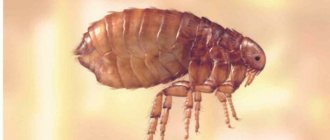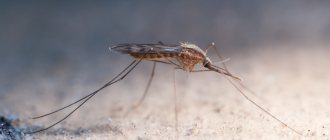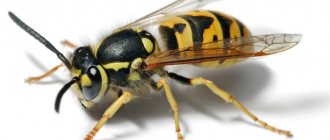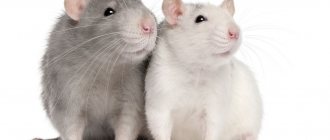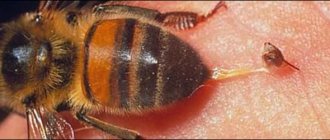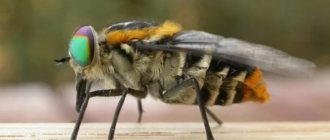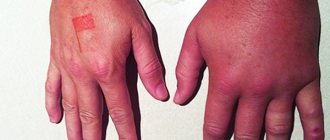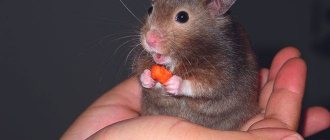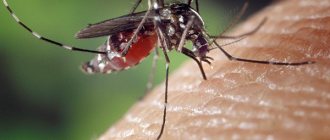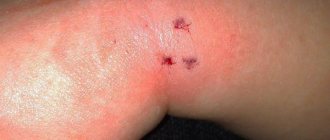Mice are shy and cautious animals. Having settled next to a person, they go out in search of food only after making sure they are safe. This continues as long as their family is small. High fertility quickly increases the number of rodents in the house, and food becomes scarce.
In search of food, mice begin to run around tables and under cabinets. They can even climb onto a person’s bed, especially those who like to chew something tasty in bed.
Do mice bite?
Mice attack people only in critical situations for rodents. Usually they try to hide and not be seen. Instincts force you to defend yourself and overcome fear when:
- There is a threat to life. Animals can climb on a sleeping person. An inadvertently pinned mouse will definitely bite, saving itself. It is also dangerous to pick up an animal that is lying on the floor and looks sick. Whatever humanitarian goals are pursued, the rodent will perceive this as an attack.
- A threat to the animal's home appears. Even accidental destruction of mouse nests, for example, when dismantling old things in the attic or basement, causes aggression in animals. You cannot consider yourself protected from mouse bites by wearing boots. The animals easily climb on a person, clinging to clothing with sharp claws, and quickly get to those places where their teeth can cause pain.
- The need to protect offspring. With any threat to the little mice, real or imaginary, maternal instinct makes them forget about fear and attack the enemy, no matter how much larger it is in size. Not only people, but also cats and dogs can suffer.
Kus
What does a mouse bite look like?
The animal has sharp teeth that can cause serious wounds. A mouse bite can look different, it all depends on how a person behaves at that moment in time:
- Light scratches from teeth . This happens when a rodent's incisors touch the skin only tangentially. This can happen if, for example, you jerk your hand sharply at the moment when the mouse is about to sink its teeth into a person’s finger.
- One or two continuous stripes left by the front incisors. Outwardly they look like a pair of punctures at a short distance, since the mouse has a small mouth. This is how an animal can bite a sleeping person.
- With torn flesh pulp. This happens if you jerk your hand hard at the moment when the animal’s teeth have already sunk into it.
How can you get infected from a rodent bite?
Despite the slight blood loss, a mouse bite is more dangerous than it seems at first glance. Animal saliva often contains pathogens of serious infections that these animals carry. Infection may not be detected immediately, as symptoms appear later.
Diseases that can be transmitted by a mouse bite:
- Rabies. The first signs of the disease are headaches, a slight increase in temperature, and a depressed mood. As the disease progresses, hallucinations and epileptic seizures may appear. If treatment is not started on time, death occurs due to the destruction of brain cells. Rabies from a mouse bite is treated with rabies immunoglobulin vaccine.
- Tularemia. The first symptoms may appear either after a day or after a month. The temperature rises to +38...400C, weakness and muscle pain are felt. Then the lymph nodes become inflamed, a rash appears on the skin, and blood pressure is reduced. Secondary pneumonia may develop.
- Leptospirosis. Primary symptoms are similar to tularemia. The differences are puffiness, redness of the face and neck, and an increased vascular pattern in the eyes. At the second stage, internal organs are affected - kidneys, liver, nervous system. The skin becomes jaundiced.
- Tick-borne encephalitis. The disease manifests itself on the 5th–6th day of infection immediately in an acute form. Sometimes patients can name the exact time when they became ill. Chills appear, temperature rises, weakness. If left untreated, the virus can affect the brain and spinal cord.
- Plague. The risk of being bitten by an animal infected with this disease is minimal, since the animals themselves die from it on the second day.
Carries diseases
The listed diseases do not reflect the entire list that a mouse bite can lead to, so you should not delay going to the doctor.
Is a mouse bite dangerous?
A mouse is a small animal belonging to the rodent family. Not everyone knows that mice bite. Both adults and children can wake up from a pest bite at night. Although cases where a house mouse would attack a person first in the evening are quite rare. The tailed pest becomes aggressive when its offspring or home are threatened.
On a note!
Not every person pays attention to a rodent bite, believing that there is nothing dangerous about it. However, we should not forget that small and harmless-looking mice carry diseases that are dangerous to humans.
Therefore, the consequences of a bite may not be at all rosy:
- Thus, tick-borne encephalitis is accompanied by headache, gag reflex, cramps and numbness of the facial and neck muscles.
- No less dangerous is an infectious disease such as leptospirosis. It affects the nervous system, kidneys and liver. Symptoms of the disease include constant insomnia, chills, pain in the calf muscles, and jaundice.
- Mice can also carry tularemia, a disease that affects the skin, eyes, lymph nodes and lungs.
- A mouse bite can also cause rabies, leading to epilepsy, paralysis and even death of the victim.
- Sodoku is another disease that can be caused by a mouse bite. Fever, arthritis and skin rashes may occur. If measures are not taken in a timely manner, the consequence of a bite can be fatal.
What to do if bitten by a mouse?
If a wound is caused by a rodent, it is not enough to simply bandage it. If it is not possible to see a doctor immediately, you should know what and how to do first.
First aid
When a mouse has bitten a finger or other part of the body, first aid can be provided at home if you act correctly.
- The wound should immediately be washed for 15 minutes in running water and laundry soap. An alkaline environment is unfavorable for the development of bacteria.
- If the scratches are superficial, then it will be enough to disinfect them. If the flesh on the finger is torn after treatment with a disinfecting solution, the wound should be bandaged with a sterile bandage. With punctures the situation is more complicated. It is advisable to carefully try to draw blood out of it, thus removing pathogenic bacteria. After this, you can use a bandage or plaster.
- If signs of an allergic reaction appear, take antihistamines.
- If a rodent can be caught after a bite, it should be sent to a medical laboratory to understand what infection it was carrying.
Children most often suffer from pets, so you need to teach your child how to handle them correctly so that a decorative mouse does not bite him. Children should also be warned about the dangers of playing with field mice.
When should you see a doctor?
Pets rarely carry serious diseases, but when bitten by a field mouse, you should consult a doctor in any case, even in the absence of symptoms.
If signs of a cold appear in the next two to three weeks, then a visit to a specialist cannot be postponed, since many diseases begin this way.
The doctor will tell you what to do, give directions for tests, and prescribe a vaccine against tetanus and rabies, especially if the mouse has bitten until it bleeds.
Consequences of a mouse bite
In addition to the serious diseases that rodents carry, a mouse bite can have other consequences.
The animals live in garbage dumps and basements, where conditions are far from sterile, so they have a lot of pathogenic microorganisms on their teeth. Getting deep under the human skin, they cause sepsis. The closed wounds begin to fester. You cannot do without medical help here.
Treatment of the wound
Consequences of injury
The wound received after an attack by an animal is not just damage to the skin, like a scratch. The saliva of a mouse, a potential carrier of pathogens of dangerous diseases, inevitably penetrates through the tissues affected by the teeth into the blood of the victim. Blood loss is minimal, but this does not mean that infectious infection has not occurred. Neglecting a mouse bite can result in irreversible health problems.
The insidiousness of injury lies in the fact that the symptoms of the disease do not appear immediately, and after the infection spreads in the body, systemic failures in the functioning of the internal organs begin. It may be impossible to get rid of pathology at a later stage. This is why prevention is so important in the first days after unpleasant contact with rodents.
If you are bitten by a mouse, the consequences may be as follows:
- leptospirosis - causes pathology of the liver, kidneys, nervous system, provokes the development of jaundice. Human susceptibility to bacteria of the genus Leptospira is the cause of the most frequent infections. The development of hemorrhagic syndrome accompanies a severe form of the disease;
- tularemia - leads to damage to the skin, eyes, and lungs. Characterized by a decrease in blood pressure, signs of anorexia, weakness, muscle pain and headaches. Inpatient treatment required;
- encephalitis - affects the nervous system, accompanied by severe muscle pain, cramps, numbness of the neck and face, chills, and high fever. The development of pathology leads to paralysis and death;
- listeriosis - develops in people with weakened immune systems; the infection is especially dangerous for women during pregnancy, as it leads to miscarriage;
- yersiniosis (pseudotuberculosis) - manifests itself in general intoxication, damage to the gastrointestinal tract. Difficult to diagnose due to various clinical manifestations. Lack of adequate treatment leads to paralysis of internal organs and the musculoskeletal system;
- cryptospiridiosis - dehydrates the body by disrupting the digestive system; urgent medical attention is required.
One of the causes of severe sodoku disease is also considered to be a mouse bite. Photos of patients reflect characteristic skin rashes. Manifestations of fever accompany the development of pathology. Without a correct diagnosis, which is difficult to make due to the similarity of symptoms with rheumatoid arthritis, and timely treatment, death occurs in more than half of those affected. It is possible to stop the development of the disease by injections with potent antibiotics.
Mice are carriers of the most terrible diseases - plague, rabies, tetanus, although cases of infection from them are extremely rare. Infected rodents themselves have no protection against dangerous infections and quickly die.
The insidiousness of a mouse attack is that many do not take minor damage from the animal seriously. The absence of severe pain misleads you into thinking that the threat has passed and there is no need to seek medical help.
It is important to remember about a mouse bite and the consequences. The doctor decides what to do to prevent infection, but before visiting doctors, it is equally important to provide first aid.
How to avoid being bitten?
Basic safety rules will in most cases help avoid rodent bites. To prevent the mouse from attacking, you need to:
- Avoid places where they can be found in large numbers. As a rule, these are landfills and basements of multi-story buildings. In rural areas, rodents accumulate in granaries.
- At the first sign of mice appearing in the house, carry out deratization.
- Do not attempt to touch animals with bare hands, even when they appear dead.
- If there are decorative mice in the house, then you need to create comfortable conditions for them and try not to pick them up.
- When planning to clear out trash from an attic or basement, you should wear thick clothing, boots, and work in canvas gloves. Thus, the risk that a mouse will be able to reach human skin with its teeth will be reduced several times.
- When traveling outside the city, you should carefully choose a vacation spot, especially near bodies of water.
First aid
In any situation, a person who has been bitten by a mouse (even a domestic one) needs to competently provide first aid.
Afterwards, you should immediately go to the doctor, if possible taking the attacked rodent in a container or jar so that a laboratory can study whether the mouse could cause any infection.
If the skin is damaged to the point of bleeding, the algorithm for providing first aid after contact with a mouse should be as follows:
- You need to rinse the damaged area with running water and try to squeeze out as much blood as possible from the deep bite. The procedure should last at least 15–20 minutes. You can use laundry soap.
- Treat the damaged area with hydrogen peroxide. You can use iodine, alcohol, vodka or cologne if peroxide is not on hand.
- Apply a sterile dressing (bandage or bactericidal patch) to the wound.
Further assistance is provided by doctors. After examining the wound and assessing the condition of the victim, the specialist prescribes preventive vaccination against tetanus. To reduce the risk of infection, a course of antibiotic therapy is prescribed.
Not all diseases transmitted through a bite manifest themselves immediately, so the victim is registered. You will have to be under medical supervision for at least a month - most infections have a long latent period.
